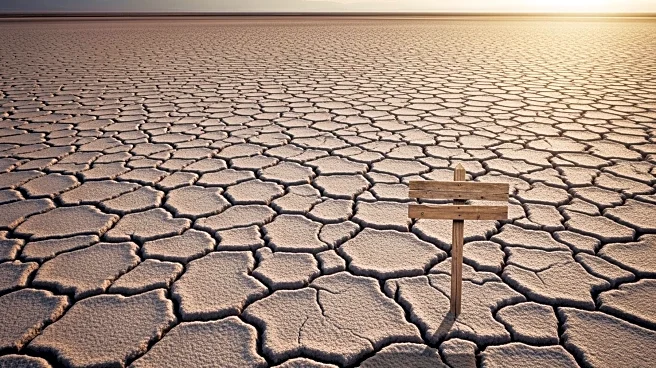What's Happening?
The Dead Sea has been ranked as the world's second most disappointing tourist site, a result attributed to decades of neglect by Israeli authorities. Merav Ayalon, a resident of Ein Gedi, expressed disappointment
over the lack of efforts to revive the area, which has seen significant environmental degradation. The southern part of the Dead Sea is now mostly evaporation ponds, while the northern part is facing similar challenges. Guy Golan, a local tour operator, highlighted the area's unique natural beauty and the need for creative solutions to make it accessible to tourists. Despite the challenges, there are still hidden gems in the region that offer stunning views and experiences.
Why It's Important?
The decline of the Dead Sea as a tourist destination has broader implications for Israel's tourism industry and environmental conservation efforts. The region's neglect reflects a missed opportunity to leverage its unique natural features for sustainable tourism and economic growth. Reviving the Dead Sea could serve as a foundation for peace and cooperation in the region, promoting cross-border tourism and cultural exchange. The situation underscores the need for significant investment in environmental restoration and infrastructure development to preserve the area's natural beauty and attract visitors.
What's Next?
Efforts to restore the Dead Sea will require substantial funding and collaboration between government agencies, nonprofits, and local communities. Raising awareness through campaigns and influencers could help garner support for conservation initiatives. The Israel Nature and Parks Authority is working to improve accessibility and safety in areas like Ein Gedi, offering hope for future tourism development. Long-term solutions will involve balancing environmental preservation with economic interests, potentially transforming the Dead Sea into a model for sustainable tourism.
Beyond the Headlines
The Dead Sea's decline highlights the ethical and environmental challenges of managing natural resources in a region with complex geopolitical dynamics. The area's transformation from a natural wonder to a site of disappointment reflects broader issues of environmental degradation and resource exploitation. Addressing these challenges requires a holistic approach that considers the cultural, historical, and ecological significance of the Dead Sea. The situation serves as a reminder of the importance of sustainable development and the need to prioritize environmental conservation in tourism strategies.









